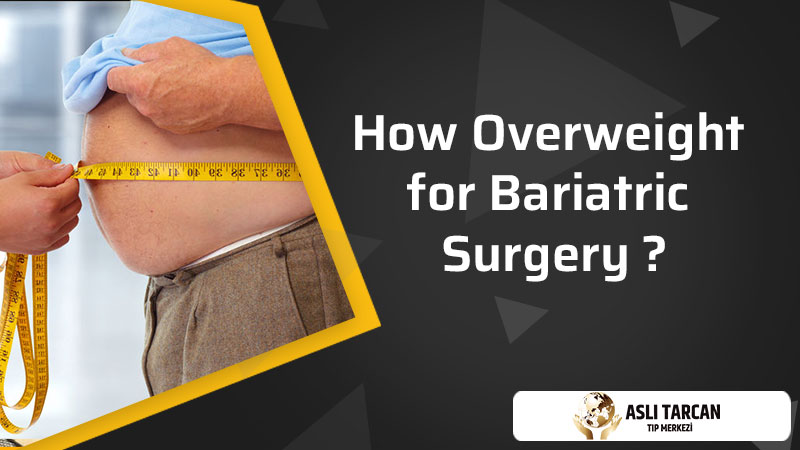How Overweight for Bariatric Surgery Do you know how overweight for bariatric surgery? Do you want to know if bariatric surgery, such as the Lap Band, gastric bypass, gastric sleeve, or Realize Band, is suitable for you? The requirements for bariatric surgery vary somewhat depending on the patient and technique. Patients must, however, satisfy some minimum standards to be deemed excellent candidates for weight loss surgery. These requirements are listed below. If you say how overweight for bariatric surgery, your body mass index should be above 35.
The first step toward surgical weight loss is determining your BMI (BMI). In the BMI calculator below, simply input your height, weight, and gender.
How Overweight for Bariatric Surgery
If your body mass index (BMI) is more than 30, you may be a candidate for bariatric surgery.
If you have struggled with obesity for a long time, you may be a candidate for bariatric surgery.
Weight reduction surgery is intended for those who have been overweight or obese for a long time — in many cases, bariatric surgery patients have spent their whole adult life struggling with their weight.
If you have a Body Mass Index (BMI) of more than 40 (or 35+ with Co-Morbid Conditions): A high BMI is a significant criterion for bariatric surgery.
In general, you must have a BMI of 40 or higher to be considered for weight loss surgeries such as gastric bypass, and a BMI of 30 or higher to be eligible for treatments such as the Gastric Balloon.
Patients with a BMI between 35 and 40 with one or more comorbid conditions (conditions associated with being overweight or obese) may also fulfill the requirements for bariatric surgery.
Type 2 diabetes, high blood pressure (hypertension), obstructive sleep apnea, osteoarthritis, and heart disease are examples of obesity-related comorbid disorders.
Your Previous Attempts at Weight Loss Have Failed
The failure to reach and maintain healthy body weight, even after following one or more medically supervised weight loss programs over a lengthy period of time, qualifies you for bariatric surgery.
You’re Ready to Make a Diet Change
Weight loss surgery is intended to assist obese patients in losing weight by drastically lowering stomach capacity (and hence the number of calories the patient may ingest) and/or the number of nutrients, carbs, and sugars in meals. The patient consumes food.
If you undergo bariatric surgery, you must follow strict dietary instructions for the rest of your life and stick to this modified diet. Otherwise, you may experience significant problems following surgery or acquire undesired weight.
Our trained dietitians at your New Self are ready to assist our patients in planning nutritious, pleasurable meals that promote long-term health and wellness.
You’ve Decided to Be Active
Regular exercise is an essential component of post-operative therapy for obese individuals. Exercising and remaining physically active can aid in the management of comorbid diseases such as diabetes, enhance mental health, and reduce the chance of problems following weight reduction surgery.
Your Mental Health Is Under Control
Patients considering bariatric surgery should be aware that a variety of variables may have contributed to their continuous battle with obesity. Medical issues, food habits, and mental illnesses such as melancholy, anxiety, and eating disorders are all factors that impact obesity.
To satisfy the criteria for bariatric surgery, you may be required to undergo a psychiatric examination. If required, you can be treated for problems that make it difficult for you to cope with the changes that occur in your body following bariatric surgery.
Eligibility for Weight Loss Surgery
In general, insurance companies consider you qualified for weight reduction surgery coverage if you have a BMI of 40 or higher OR
Your BMI is between 35 and 40 AND you have a serious health problem, such as:
- Diabetes
- Cardiovascular disease, which includes high blood pressure, excessive cholesterol, and severe heart disease
- Joint discomfort that is incapacitating
- Obstructive sleep apnea
- Acid reflux or GERD that is uncontrolled
- Hypertension of the lungs
If your BMI is less than 35, your insurance company may refuse to pay for weight loss surgery. We also know that this is subject to change because your weight fluctuates based on where you are in the diet cycle.
Bariatric Surgery
Obesity is quite widespread, and it interferes with how many individuals go about their everyday lives. A surgical technique known as gastric banding, sometimes known as lap band surgery, is a common approach to help weight loss.
In laparoscopic surgery, they use it to place an adjustable belt on the upper part of the stomach during gastric banding. They fill the silicone tape with saline. They tighten it by attaching it to a port under the skin of the abdomen. The port adds or subtracts saline from the band.
The band will limit the size of the stomach as well as the amount of food it can hold. It slows food transit into the intestines and tells the brain to make the stomach feel fuller with less food.
Do you think you’re a good candidate for Lap Band Surgery?
Candidates for lap band surgery must be over the age of 18. They should have a BMI of 35 to 40. Must have medical problems such as diabetes, high blood pressure, or obesity associate with being overweight or obese. Obstructive sleep apnea.
Doctors will also examine the patient’s medical history to see if standard diet and exercise have been beneficial. They carefully screen patients with a history of gastrointestinal, cardiac, or lung problems as they may be at high risk for surgery.
We will review your alternatives, check your medical history. We’ll talk about what steps you should take if the surgery is right for you.
Before surgery, it is often necessary to make lifestyle modifications such as eating smaller meals and avoiding high-calorie foods.
If You Are Not a Good Candidate for Weight Loss Surgery
If you are not a candidate for bariatric surgery, you may choose to try the following weight loss options:
- Medical Weight Reduction
- Procedures for Endoscopic Weight Loss
- Adult Diet and Fitness Center at Duke
- Duke Kids Healthy Lifestyle Program is a program for children and adolescents.
How Overweight for Gastric Sleeve One Should Be, to Get Approved?
Gastric sleeve surgery is a popular weight-loss procedure that has helped countless individuals achieve their weight-loss goals. However, before this procedure, potential patients must meet specific criteria to be approved for the surgery. Contextually, how overweight for gastric sleeve one should be to get approved?

The accepted qualifications for weight loss surgery include the patient’s health history, age, and lifestyle. Body mass index (BMI) is a measure of body fat based on your height and weight. The higher your BMI, the more likely you will be approved for the surgery. Generally speaking, individuals with a BMI of 40 or greater are considered eligible for gastric sleeve surgery. However, those with a BMI between 30-39.9 may also be considered eligible if they have other health issues related to their weight (e.g., diabetes or high blood pressure).

Your doctor will also consider any health risks associated with undergoing gastric sleeve surgery. Ultimately, it is up to the doctor to decide whether or not a patient is eligible for the surgery. We hope this article will give an idea of ‘how overweight for gastric sleeve one should be?’


